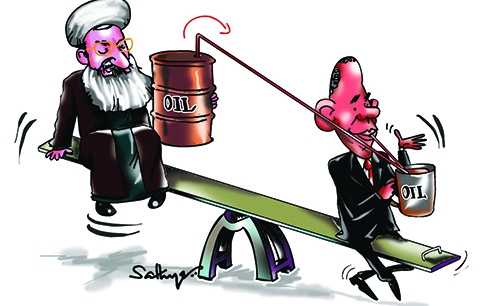US, Iran leaders hail nuke deal but US imposes new sanctions
The US and Iranian Presidents on Sunday hailed the implementation of Tehran's nuclear deal as historic, even as new American sanctions threatened fresh tensions.
The UN's atomic watchdog confirmed in Vienna late on Saturday that Iran had complied with its obligations under last summer's accord, leading the United States and the European Union to lift sanctions.
But, in a sign of those differences, Washington announced it had decided to target the Islamic republic's ballistic missile programme with new measures.
Meanwhile, the UN Security Council on Sunday removed the Iranian bank Sepah and its international subsidiary from the UN sanctions blacklist after Iran came into compliance with the nuclear deal.
Iran's oldest bank, Bank Sepah and Bank Sepah International, were placed on the sanctions list in 2007 for supporting Iranian firms linked to the developement of missile technology.
Iran's President Hassan Rouhani, a moderate whose 2013 election victory helped launch a huge diplomatic effort towards the deal struck on July 14 in Vienna, said the implementation was a crucial moment for his country.
"We Iranians have reached out to the world... have opened a new chapter in the relations of Iran with the world," the official IRNA news agency quoted him as saying.
In Washington, President Barack Obama said the breakthrough was vindication of his contentious policy of engagement.
"We achieved this through diplomacy without resorting to another war in the Middle East," he said in an address to the nation.
But Obama also noted that "profound differences" with Tehran remained over its "destabilising activities".
Five Iranian nationals and a network of companies based in the United Arab Emirates and China were added to an American blacklist, the US Treasury Department announced.
The White House had threatened to impose the measures last month but withdrew them after Rouhani hit out at both their timing and intent. Missiles were not part of the nuclear agreement.
Asked before the new sanctions were announced how Iran would react to fresh measures against it, Rouhani on Sunday said: "Any action will be met by a reaction."
Freed Americans leave Iran
The new sanctions came after four Iranian-Americans, including Washington Post reporter Jason Rezaian, left Tehran following their release in a prisoner swap with the United States.
The prisoner swap involved Rezaian, Christian pastor Saeed Abedini, former US Marine Amir Hekmati and a fourth man, Nosratollah Khosravi-Roodsari.
Iranian state television said they departed on a special plane to Bern in Switzerland but US officials told American media that Khosravi-Roodsari was not on board.
The plane carrying the three Americans arrived later in Geneva, a US official said.
Washington Post publisher Frederick Ryan said: "We are relieved that this 545-day nightmare for Jason and his family is finally over."
Under the exchange, Washington said it had granted clemency to seven Iranians, six of whom were dual US-Iranian citizens, and dropped charges against 14 more.
Obama welcomed the Americans' release, saying: "When Americans are freed, that's something we can all celebrate."
For a decade the sanctions, imposed in condemnation of Iran's disputed nuclear programme, had crippled the country's economy.
Rouhani, who has promised that 2016 will be a "year of prosperity" for Iranians, said that following the lifting of sanctions Iran would seek foreign investment of $30-$50 billion annually, to dramatically spur growth to eight per cent.
Iran can now increase its oil exports, long the lifeblood of its economy though Rouhani has moved away from relying on crude. The nuclear deal will also open up business in the 79-million-strong country.
US Secretary of State John Kerry said the United States was to repay Iran a $400 million debt and $1.3 billion in interest dating to the Islamic revolution.
Israeli warning
Israel, widely assumed to be the Middle East's only nuclear-armed state and Iran's arch-foe, has repeatedly slammed the agreement.
Prime Minister Benjamin Netanyahu said Iran had not given up its hope of obtaining a nuclear weapon.
"Israel's policy has been and will remain exactly what has been followed: to not allow Iran to acquire nuclear weapons," Netanyahu told cabinet on Sunday.
Related Posts

